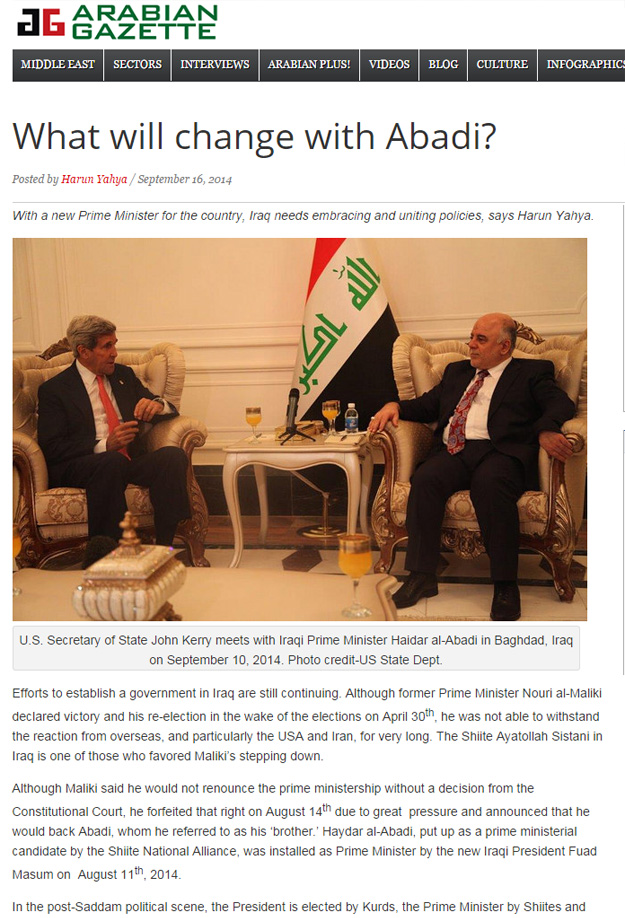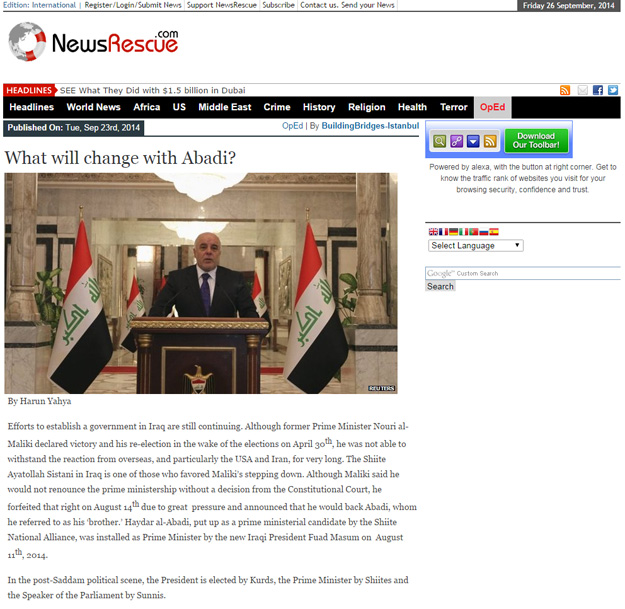
Efforts to establish a government in Iraq are still continuing. Although former Prime Minister Nouri al-Maliki declared victory and his re-election in the wake of the elections on April 30th, he was not able to withstand the reaction from overseas, and particularly the USA and Iran, for very long. The Shiite Ayatollah Sistani in Iraq is one of those who favored Maliki’s stepping down.
Although Maliki said he would not renounce the prime ministership without a decision from the Constitutional Court, he forfeited that right on August 14th due to great pressure and announced that he would back Abadi, whom he referred to as his ‘brother.’ Haydar al-Abadi, put up as a prime ministerial candidate by the Shiite National Alliance, was installed as Prime Minister by the new Iraqi President Fuad Masum on August 11th, 2014.
In the post-Saddam political scene, the President is elected by Kurds, the Prime Minister by Shiites and the Speaker of the Parliament by Sunnis.
The difference between Abadi and Maliki
Abadi and Maliki were both members of the Islamic Da’wa Party, which advocated anti-Ba’athist policies in the time of Saddam Hussein. Both were forced to leave Iraq during Saddam’s era and they both returned after he was overthrown. Two of Abadi’s brothers were executed by the Ba’athist regime in 1982 for being members of the Da’wa Party and another was sentenced to ten years’ imprisonment; these experiences prove that Abadi has gone through difficult times. At that time he was pursuing a doctorate in engineering at the University of Manchester in England. Maliki, another politician in exile, had been in Iran since the 1980s engaged in activities aimed at weakening the Iraqi Ba’ath regime.
The same pair are now members of the largest Shiite party, the Da’wa. The reason why Abadi was preferred over Maliki for the prime ministry derives from the very different characters of the two. Maliki is more aggressive and forceful, while Abadi is a skilled negotiator who employs a constructive and conciliatory approach. There are accusations of Maliki’s forces using violence, corruption and torture. Abadi is well known to favor the prevention of such crimes.
The USA is known to be working to convince Shiite deputies to relax the ban on the Sunni Ba’ath Party in an effort to reduce the sectarian conflicts in Iraq that have been ongoing since 2007. However, Maliki’s harsh attitude and exclusion of Sunni tribes meant that no climate of love could be established; his harsh and repressive attitude merely invited sectarian conflict. With his moderate profile, however, Abadi’s views leave the door open to Sunni politicians’ looking for allies. In these respects, his views are less ideological and more moderate than those of Maliki. He is said to be capable of setting aside the sectarian zealotry when it comes to such crucial matters such as Iraq’s territorial integrity and power-sharing. Maliki’s views regarding government and the economy were more classically statist in nature, while Abadi is in favor of private enterprise.
Can Iraq maintain its political integrity?
Abadi faces a difficult time ahead. In taking control of the middle of the country, ISIS also seized Mosul, an oil-producing region. Army units in many places abandoned their weapons and fled rather than fight ISIS, and some Sunni tribes are known to support them. As emphasized by Prof. Yezid Sayigh, an expert on Middle Eastern politics from the Beirut office of the Carnegie Foundation, one of the ways to weaken ISIS is to embrace Sunni groups with love and unite with them. Most of these groups may well be opposed to the Shiite policies in Baghdad, but they still want to remain part of a united Iraq nonetheless.
In this climate, Abadi will also seek to establish a dialogue with various groups, especially the Kurds in the north and the Sunnis who control the central part of the county for the sake of the country’s territorial integrity. His main task will be to take Kurd and Sunni partners into the government. However, the regional Kurdish Administration looks coolly on Abadi, who believes that oil revenues from the Kurdish region should be shared across the country.
The solution is policies of love
Iraq needs embracing and uniting policies. The key to a solution is for everyone to be embraced with love, no matter what their beliefs or ethnicity, and for their rights to be protected. People who lived together for hundreds of years and faced many troubles as a united nation are now on the brink of civil war due to policies of hatred. War means the death of scores of people, the wholesale destruction of cities, economic collapse and societal breakdown. Working for reconciliation with love, respect and understanding, rather than choosing to fight, and sharing and helping regardless of sectarian differences and producing solutions that will help everyone in the event of problems, is what is going to make Iraq strong enough to withstand this wild fire currently sweeping the country.
Adnan Oktar's piece on Arabian Gazette & News Rescue:
http://www.arabiangazette.com/what-will-change-with-abadi/
http://newsrescue.com/will-change-abadi/#axzz3ECDjvNk1



